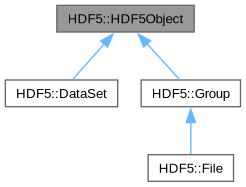#include <deal.II/base/hdf5.h>
|
| template<typename T > |
| T | get_attribute (const std::string &attr_name) const |
| |
| template<typename T > |
| void | set_attribute (const std::string &attr_name, const T value) |
| |
| std::string | get_name () const |
| |
| template<> |
| std::string | get_attribute (const std::string &attr_name) const |
| |
| template<> |
| void | set_attribute (const std::string &attr_name, const std::string value) |
| |
Base class for the HDF5 objects.
Definition at line 349 of file hdf5.h.
◆ HDF5Object()
| HDF5::HDF5Object::HDF5Object |
( |
const std::string & | name, |
|
|
const bool | mpi ) |
|
protected |
Constructor. string_name is the name of the HDF5 Object. If mpi is True then MPI I/O is used.
Definition at line 73 of file hdf5.cc.
◆ get_attribute() [1/2]
template<typename T >
| T HDF5::HDF5Object::get_attribute |
( |
const std::string & | attr_name | ) |
const |
Reads an attribute. T can be float, double, std::complex<float>, std::complex<double>, int, unsigned int, bool or std::string. Note that the encoding of std::string is UTF8 in order to be compatible with python3.
Datatype conversion takes place at the time of a read or write and is automatic. See the Data Transfer: Datatype Conversion and Selection section in the HDF5 User's Guide.
Definition at line 1597 of file hdf5.h.
◆ set_attribute() [1/2]
template<typename T >
| void HDF5::HDF5Object::set_attribute |
( |
const std::string & | attr_name, |
|
|
const T | value ) |
Writes an attribute. T can be float, double, std::complex<float>, std::complex<double>, int, unsigned int, bool or std::string. Note that the encoding of std::string is UTF8 in order to be compatible with python3.
Datatype conversion takes place at the time of a read or write and is automatic. See the Data Transfer: Datatype Conversion and Selection section in the HDF5 User's Guide.
Definition at line 1674 of file hdf5.h.
◆ get_name()
| std::string HDF5::HDF5Object::get_name |
( |
| ) |
const |
Returns the name of the object. In the case of File, name corresponds to the file name. In the case of Group and DataSet, name corresponds to the name of the object in the HDF5 file.
Definition at line 81 of file hdf5.cc.
◆ get_attribute() [2/2]
template<>
| std::string HDF5::HDF5Object::get_attribute |
( |
const std::string & | attr_name | ) |
const |
|
inline |
◆ set_attribute() [2/2]
template<>
| void HDF5::HDF5Object::set_attribute |
( |
const std::string & | attr_name, |
|
|
const std::string | value ) |
|
inline |
◆ name
| const std::string HDF5::HDF5Object::name |
|
protected |
Name of the HDF5Object. In the case of File, name corresponds to the file name. In the case of Group and DataSet name corresponds to the name of the object in the HDF5 file.
Definition at line 405 of file hdf5.h.
◆ hdf5_reference
| std::shared_ptr<hid_t> HDF5::HDF5Object::hdf5_reference |
|
protected |
HDF5 identifier for the objects File, Group and DataSet. The std::shared_ptr<> pointer allows the object to be copied. For example several parts of the program can share and access the same group; when all the functions that access the group are closed, the HDF5 resources of the group will be automatically released.
Definition at line 414 of file hdf5.h.
◆ mpi
| const bool HDF5::HDF5Object::mpi |
|
protected |
If true use parallel HDF5, if false use serial HDF5.
Definition at line 419 of file hdf5.h.
The documentation for this class was generated from the following files:


